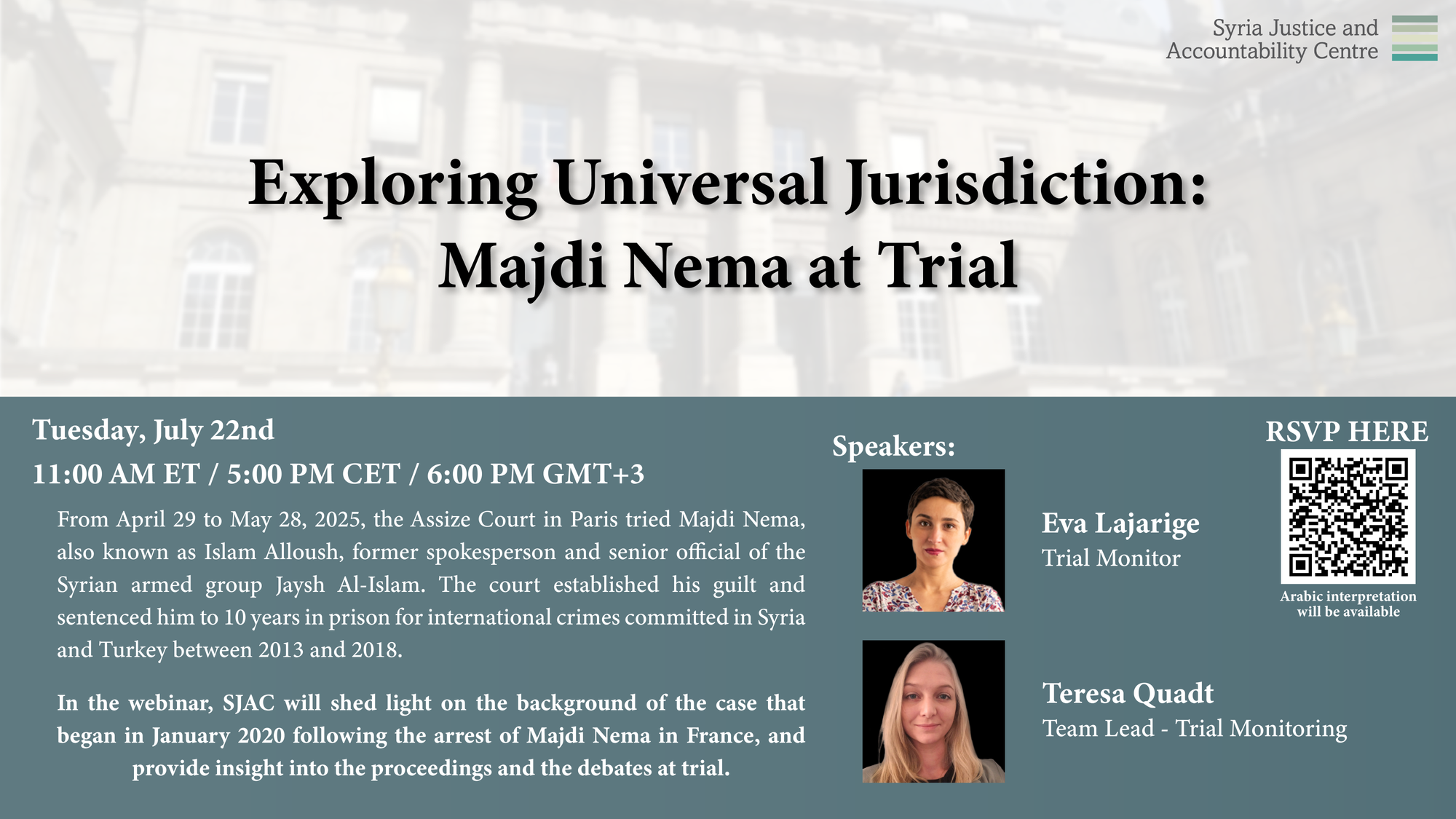
The Trial of Majdi N. aka Islam Alloush
From April 29 to May 28, 2025, the Assize Court in Paris tried Majdi N., also known as Islam Alloush, former spokesperson and senior official of the Syrian armed group Jaysh Al-Islam, for complicity in the forced recruitment of minors as a war crime and for participating in a group formed with the intent to commit war crimes committed in Syria and Turkey between 2013 and 2016. The Paris court sentenced N. to 10 years’ imprisonment.

This is the first trial related to the conflict in Syria that takes place in France on the basis of universal jurisdiction which enables national courts to prosecute foreign nationals for international crimes committed on foreign territories.
Syria-Related Criminal Prosecutions in France
French courts have already tried several cases related to the Syrian conflict based on the French nationality of the victims or of the accused - a legal ground distinct from universal jurisdiction. In May 2024, the Assize Court in Paris convicted three Syrian senior officials affiliated with the Intelligence Services, Ali Mamlouk, Jamil Hassan and Abdel Salam Mahmoud, in absentia of complicity in crimes against humanity committed in Damascus between 2013 and 2018. SJAC comprehensively monitored this trial and published detailed reports of the hearings.
In the last decade, France has further extensively prosecuted French or foreign former ISIS members for crimes committed in Syria, primarily based on domestic terrorism charges. In early 2025, five former ISIS members, including the French national Mehdi Nemmouche and the Syrian national Kais Al-Abdallah, were convicted for their role in the detention and torture of Western and Syrian hostages in the name of ISIS in 2013 and 2014. In collaboration with Impact Litigation, SJAC will publish trial reports in the coming months.
The Trial of Majdi N.
At the end of July 2019, Majdi N. traveled to France to study. He was arrested on January 29, 2020, in Marseille and placed in pre-trial detention. For a French court to have jurisdiction over the crimes Majdi N. allegedly committed on the Syrian territory against Syrian individuals, it had to establish the perpetrator’s habitual residence in France. Moreover, before a law amendment in 2023, charged international crimes under the French Penal Code had to be criminalized in the state where they have been committed (dual criminality requirement), in the case of Nema, under the Syrian Penal Code. On May 12, 2023, the Court of Cassation ruled that the requirements were met, paving the way for the trial against Nema before the Paris court.
The trial of Majdi N. spanned over 18 trial days. Three Syrian individuals and three legal entities (the International Federation for Human Rights, the Syrian Center for Media and Freedom of Expression, and the French Human Rights League) joined the case as civil parties. The court was composed of four professional judges and six lay jurors. French-Arabic translation was provided for the Accused and the civil parties during the entire trial. SJAC comprehensively monitored the trial and compiled extensive material including the questioning of Majdi N., context and expert witness testimonies on the Syrian conflict and Nema’s personality, Syrian witnesses and civil parties. SJAC further documented the closing arguments of Civil Parties, Defense Counsels, the General Prosecution (‘réquisitions’), and the judgment announcement. The judgment is not yet final as the Defense appealed. SJAC will share information on the appeal proceedings upon its start.
SJAC will soon start publishing detailed reports in English and Arabic. SJAC’s trial monitoring program establishes a historical record of the Syria-related trials and ensures the availability of documentation for victims and families.
Rather than publishing the trial reports of the Majdi N. case in chronological order, SJAC has organized them thematically and coherently based on the content of the hearings, making the material more accessible by highlighting key issues and connections across the proceedings.
___________________________
For more information or to provide feedback, please contact SJAC at [email protected] and follow us on Facebook and Twitter. Subscribe to SJAC’s newsletter for updates on our work